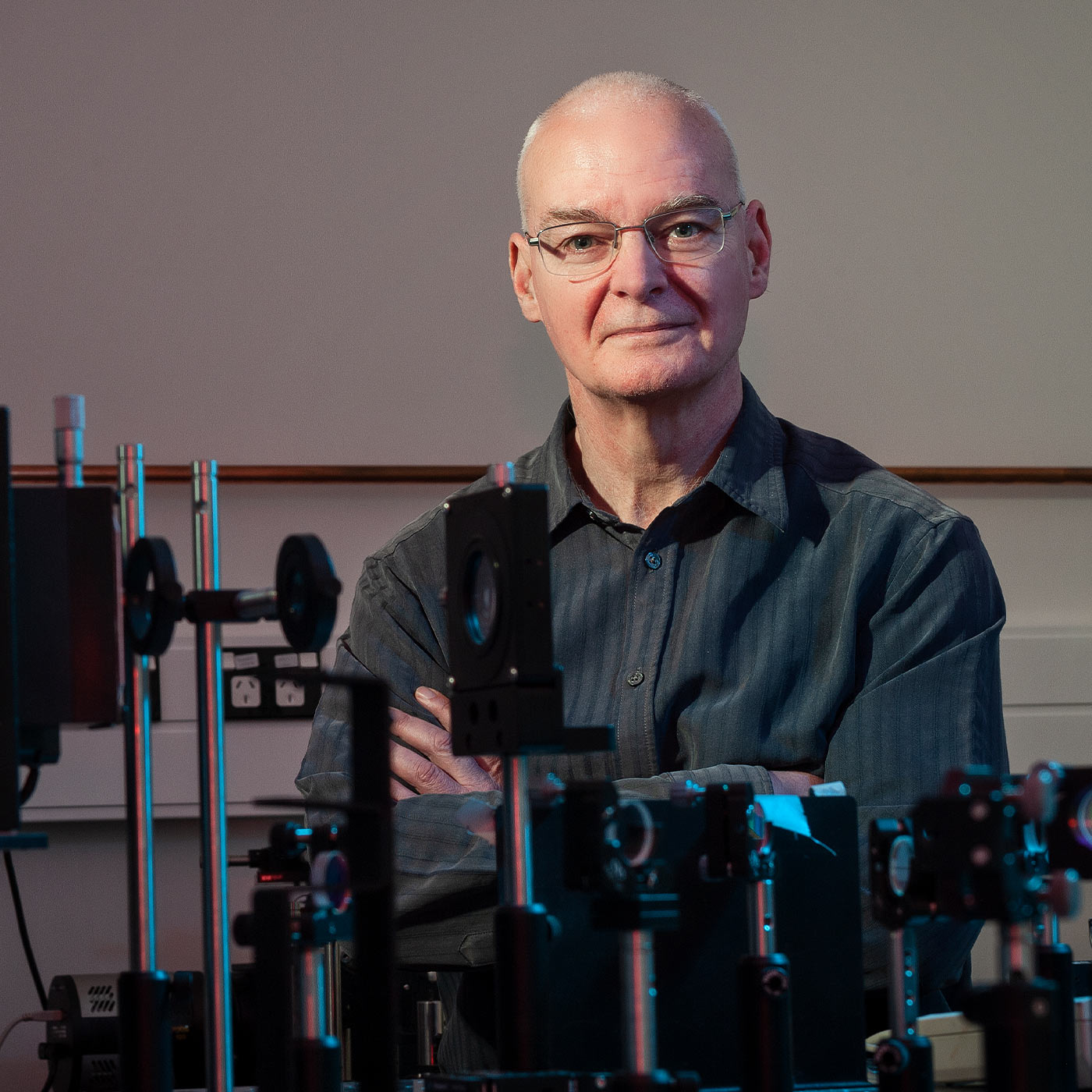Alumni News
Alumni News
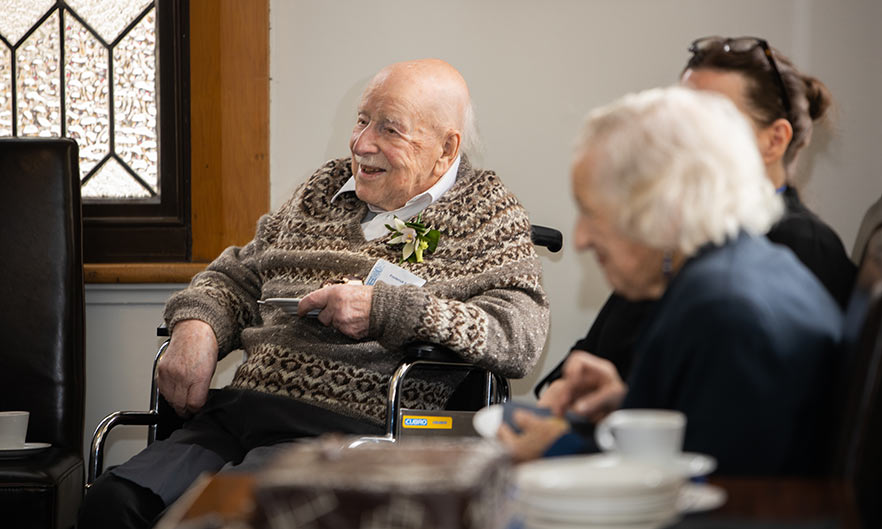
Professor Fred Fastier at his 100th birthday morning tea held at the University in 2020. Photo: Sharron Bennett.
Emeritus professor gifts estate to University
The legacy of Emeritus Professor Frederick Noel Fastier (1920 – 2021) will live on in many ways thanks to his incredible generosity to the University of Otago and the lives he touched throughout his 84-year association with the University.
Professor Fastier, who taught pharmacology at Otago between 1949 and 1980 and was the University's inaugural professor of Pharmacology, passed away in July aged 101, leaving his entire estate to the University.
This final gift follows decades of giving to Otago and will be added onto, to support into perpetuity, the areas he had already established. Since the mid-1990s Fastier has supported the Fastier Prestigious Summer Studentships, which fund BSc, BSc (Hons) and MSc Pharmacology and Toxicology students over a 10-week summer research project. In 2010 he donated his 1,200-strong collection of Science Fiction titles to the University's Special Collections, and between 1966 and 2005 he gave 122 works of art to the Hocken Collections.
In 2018 he said in an interview that it was important to him to give back to the University, having himself been the recipient of others' benevolence during his studies.
“I owed them money and now I feel glad I've been able to return it,” he said.
Professor Fastier entered the University of Otago as a student in 1937 and graduated from the Science Department with a BSc. He then worked as the Chemist for the Department of Medicine, and obtained an MSc. His work at the Medical School was at first mainly in the chemical field but he became increasingly involved in pharmacological research. That led to him gaining a Beit Memorial Fellowship to study at Oxford. After obtaining a doctorate he worked in Edinburgh and New York before returning to teach back at Otago in 1949.
Following his retirement in 1980, he was made an Emeritus Professor, and never really left the University, becoming a student once again and gaining an MA in Philosophy. In recent years he often attended lectures on campus.
The University organised a morning tea to celebrate his 100th birthday in 2020.
Acting Vice-Chancellor Professor Helen Nicholson describes Professor Fastier as “one of our treasures”.
“His long-standing relationship with the University has been invaluable.”
She says he will be remembered for his inquiring mind, his dedication and commitment to Pharmacology and Pharmacy, and his wonderful generosity.
Six60 supports Otago
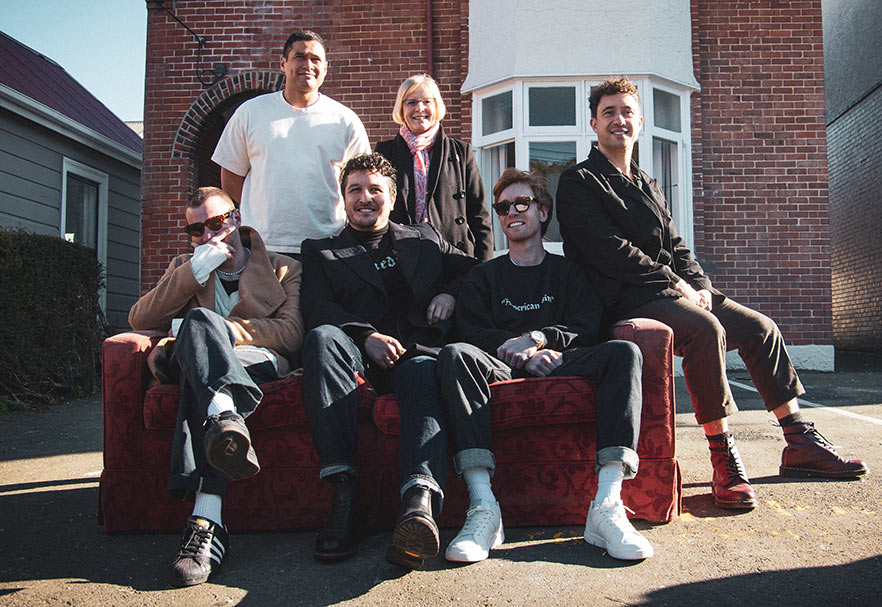
The band Six60 and Acting Vice-Chancellor Professor Helen Nicholson (centre): “Our roots have always been in Dunedin and at 660 Castle Street. Owning the house and being able to preserve its mana is something we have always dreamed of …”
Aspiring performing artists have a new opportunity to follow their dreams thanks to an initiative from the biggest band to have got its break at the University of Otago.
Iconic music group Six60 have bought their old flat in Castle Street and partnered with the University, signing an agreement at the end of July at Te Korokoro o te Tūī, Otago's new Performing Arts centre, under which both Six60 and the University will provide two $10,000-a-year scholarships each, for a total of four aspiring Performing Arts students to live at the flat.
The successful applicants will get to live at the iconic Castle Street house where the band got their big break, plus the opportunity to receive some mentoring from the band.
“The four scholarships and the possibilities of some mentoring from the band are exciting developments that will support some current Otago students to pursue their dreams in the music world.”
Lead singer Matiu Walters says the band is ecstatic to be giving back to a place that gave them their big break.
“Our roots have always been in Dunedin and at 660 Castle Street,” he says. “Owning the house and being able to preserve its mana is something we have always dreamed of, but being able to realise it now is incredible.
“The University has always been as important a part of the Six60 story as the house, so to be able to partner with Otago, give back and create an opportunity for the next generation to start their journey is something we are really excited about.”
Acting Vice-Chancellor Professor Helen Nicholson says the University is delighted to be working alongside the band on this initiative.
“We know that Dunedin and the University of Otago is a key part of the Six60 story and we are very pleased to be able to work with the band to create new opportunities for students,” she says.
“Their iconic Castle Street flat has become a North Dunedin landmark and this collaboration both recognises the flat's significance and repurposes it to support the aspirations of our current students.
“The four scholarships and the possibilities of some mentoring from the band are exciting developments that will support some current Otago students to pursue their dreams in the music world.
“Alongside the recent construction of our state-of-the-art recording studio, this is a real boost for performing arts at Otago and underlines the very particular opportunities that we have for students here in Dunedin. We sincerely thank the band for giving back to the student community that they once called home.”
The four scholarship recipients who will live in the house in 2022 were, at the time of going to print, being selected by a panel than included a representative from Six60.
“It delights me knowing that some of the past medical students are willing to support the current students. We have shared similar journeys and the same goal somehow.”
Class of '79 supports next generation of doctors
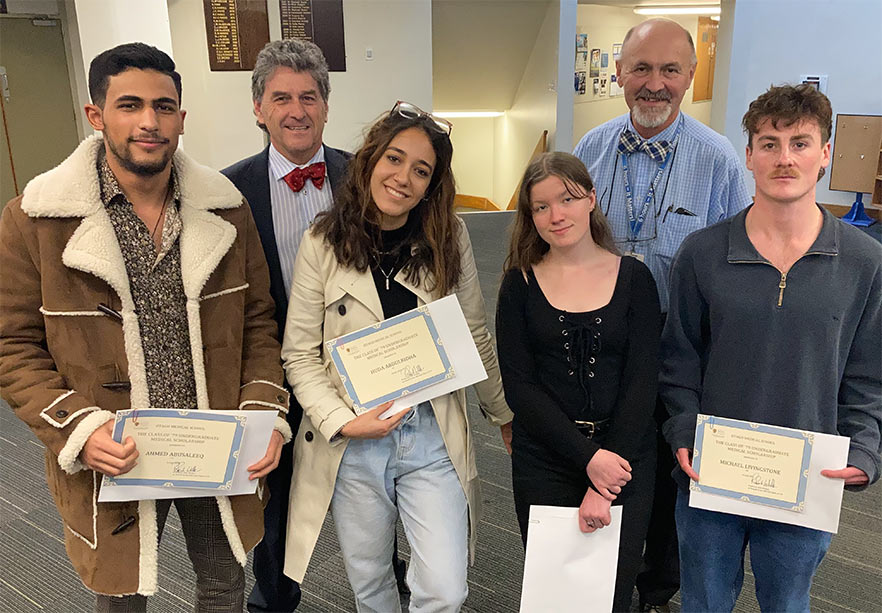
(From left): Ahmed Abusaleeq, Professor Rob Walker, Huda Abdulridha, Katie Attwell, Mr Mike Hunter and Michael Livingstone.
A rise in donations has led to an increase in scholarships from a group of generous Otago Medical School graduates.
The Otago Medical School Class of 1979 Undergraduate Medical Scholarship provides support for second- and third-year undergraduate medical students suffering financial hardship.
In previous years, two $3,000 awards have been made, but a growth in the trust funds has allowed four scholarships to be awarded for 2021.
Professor Rob Walker and surgeon Mr Mike Hunter, who studied together in the MB ChB class of 1979, were on hand in July to present the scholarships to this year's recipients Huda Abdulridha, Ahmed Abusaleeq, Katie Attwell and Michael Livingstone.
The scholarship fund was started after the medical class's 20-year reunion and had grown through a combination of lump sums and regular contributions. The fund is administered by the Otago Foundation Trust.
The class initially held reunions every 10 years, but have been held five-yearly since 2004 with a presentation about recent scholarship recipients shown at every reunion.
Hunter said monthly donations to the fund had been rising and he hoped four annual scholarships would become the norm.
“We'd like to give 10 scholarships. There are so many deserving stories and a hell of a lot of hardship.”
Candidates for the scholarships must be New Zealand citizens or residents enrolled in the second- or third-year of the MB ChB course. Financial hardship which may limit the student's ability to otherwise complete the course is the main criterion for the scholarship, in conjunction with academic ability and personality.
Walker said the decision to increase the number of scholarships was easy, but deciding on the recipients was more difficult.
“There were so many worthy candidates.”
One of the four successful recipients, Ahmed Abusaleeq, says receiving the scholarship was unexpected and he was “surprised and so grateful”.
The scholarship has helped him buy medical equipment and books, and also pay for some dental care which was previously out of his budget.
“I have paid off some of my debt and saved some money to help me get through the semester without struggling. I have also given back some of this money to our community as I believe that no matter how much I spend for good, I will always get something in return.”
He says the fact that the scholarship is awarded mid-year rather than at the beginning of the year is especially helpful, as this can be when students are struggling most.
“It delights me knowing that some of the past medical students are willing to support the current students,” he says. “We have shared similar journeys and the same goal somehow. The idea of giving back to our community is great. It makes me think of the future students and how we can support them in the near future!”
Otago's Director of Development and Alumni Relations, Shelagh Murray, says the scholarships are a wonderfully generous initiative and provide meaningful support to the next generation of doctors.
“We're very grateful to the class of '79 alumni for giving back to the University and the Medical School in this way,” says Murray. “The scholarships provide much-appreciated financial support, and they also create a valuable connection between our alumni and the students following in their footsteps.”
Walker and Hunter hope other graduating Medical School classes will be inspired to set up their own scholarships.
“We were saying a couple of weeks ago that some of the other classes that are coming through should join us. We're not going to be here forever!” Walker said.
The next Otago Medical School Class of '79 reunion is planned for Wellington in 2024.
CAPTIONS
School of Public Health and Primary Care Campus, Fiji National University.
Partnership addresses global health problems
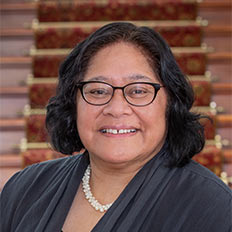
Rev. Alofa Lale: “We welcome the opportunity to support this new initiative in Fiji.”
A new initiative to establish a Communicable Diseases Research Centre (CDRC) at Fiji National University builds on a longstanding philanthropic relationship between the University of Otago and Dunedin's Mercy Hospital.
In August it was announced that Otago's Global Health Institute (OGHI) and Mercy Hospital are together supporting the establishment of the new centre at Fiji National University (FNU).
As part of this initiative, Professor Philip Hill, McAuley Professor of International Health and co-director of OGHI, has been appointed as Adjunct Professor with the new research centre and is committing 20 per cent of his time to the endeavour.
Mercy Hospital, which endowed the McAuley Chair of International Health, has committed $97,500 over three years towards the employment of a co-ordinator for the new centre.
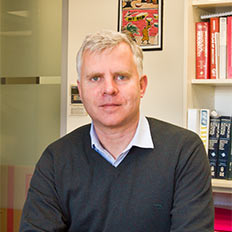
Professor Philip Hill: “We are looking forward to a long and fruitful partnership with our friends at FNU.”
“It is a great privilege to be part of this new initiative from its inception. We are looking forward to a long and fruitful partnership with our friends at FNU,” Hill says.
Mercy Hospital mission co-ordinator Rev. Alofa Lale says the hospital is excited to support the initiative.
“We welcome the opportunity to support this new initiative in Fiji. The widespread potential for considerable positive influence in the whole Pacific around communicable diseases does not go unnoticed.
“The establishment of this research centre creates a platform for proactive engagement which will hopefully strengthen collaboration capabilities around the Pacific region,” she says.
The McAuley Chair was established in 2007 and is named after Catherine McAuley (1778–1841), the founder of the Sisters of Mercy. The endowment is part of Otago's Leading Thinkers Initiative and is administered by the Otago Foundation Trust.
The Chair is funded by Mercy Hospital, Dunedin and represents a significant contribution to Mercy's commitment to address poverty worldwide and support the United Nations' Millennium Development Goals. These include the eradication of extreme poverty and hunger, reducing child mortality, improving maternal health and combating HIV/AIDS, malaria and other diseases.
The CDRC is the brainchild of Dr Donald Wilson, Associate Dean of Research at FNU's College of Medicine, Nursing and Health Sciences (CMNHS).
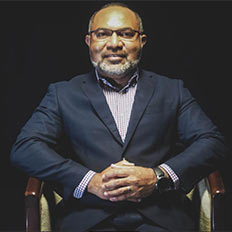
Dr Donald Wilson: “The COVID 19 pandemic has highlighted the critical need to build capacity in infectious/communicable disease research.”
“The COVID-19 pandemic has highlighted the critical need to build capacity in infectious/communicable disease research, and for that we are extremely grateful to Otago and Mercy Hospital, for Hill's time, and the funding commitment to staffing of the CDRC,” says Wilson.
Otago is already active in building human capacity for the initiative, providing strategic Otago PhD and master's scholarships to two staff of the CMNHS, both enrolled in microbiology and immunology. It is anticipated that several more FNU staff and students will be supported with PhD scholarships in the years ahead.
A major fundraising drive is anticipated in the next two years, to build world-class laboratory facilities to support the research of the CDRC.
For further information, please contact Professor Philip Hill.
